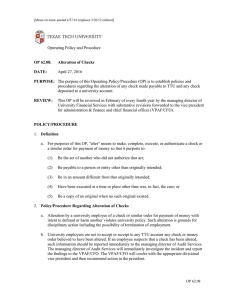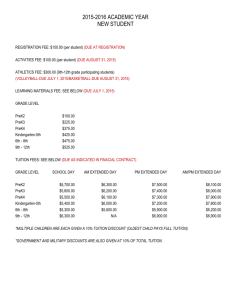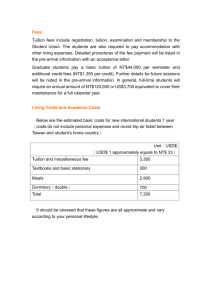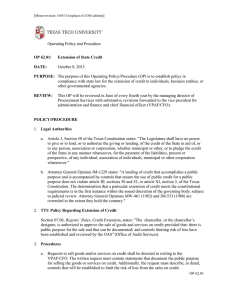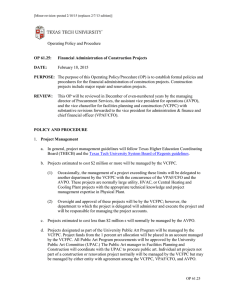Operating Policy and Procedure April 11, 2016
advertisement
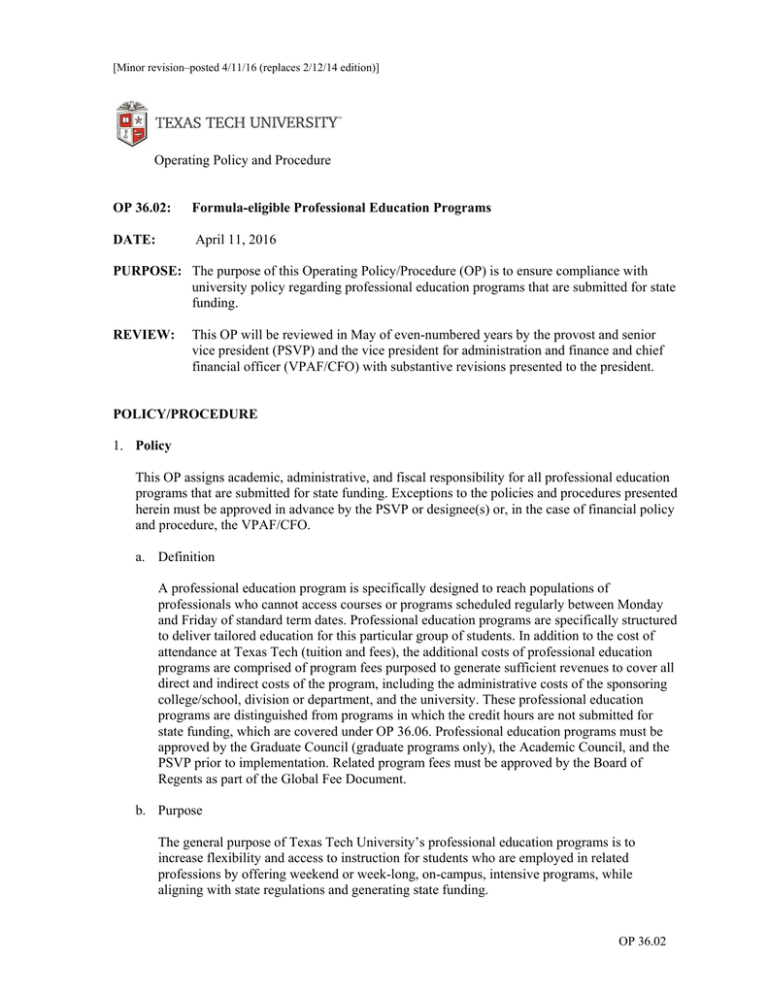
[Minor revision–posted 4/11/16 (replaces 2/12/14 edition)] Operating Policy and Procedure OP 36.02: Formula-eligible Professional Education Programs DATE: April 11, 2016 PURPOSE: The purpose of this Operating Policy/Procedure (OP) is to ensure compliance with university policy regarding professional education programs that are submitted for state funding. REVIEW: This OP will be reviewed in May of even-numbered years by the provost and senior vice president (PSVP) and the vice president for administration and finance and chief financial officer (VPAF/CFO) with substantive revisions presented to the president. POLICY/PROCEDURE 1. Policy This OP assigns academic, administrative, and fiscal responsibility for all professional education programs that are submitted for state funding. Exceptions to the policies and procedures presented herein must be approved in advance by the PSVP or designee(s) or, in the case of financial policy and procedure, the VPAF/CFO. a. Definition A professional education program is specifically designed to reach populations of professionals who cannot access courses or programs scheduled regularly between Monday and Friday of standard term dates. Professional education programs are specifically structured to deliver tailored education for this particular group of students. In addition to the cost of attendance at Texas Tech (tuition and fees), the additional costs of professional education programs are comprised of program fees purposed to generate sufficient revenues to cover all direct and indirect costs of the program, including the administrative costs of the sponsoring college/school, division or department, and the university. These professional education programs are distinguished from programs in which the credit hours are not submitted for state funding, which are covered under OP 36.06. Professional education programs must be approved by the Graduate Council (graduate programs only), the Academic Council, and the PSVP prior to implementation. Related program fees must be approved by the Board of Regents as part of the Global Fee Document. b. Purpose The general purpose of Texas Tech University’s professional education programs is to increase flexibility and access to instruction for students who are employed in related professions by offering weekend or week-long, on-campus, intensive programs, while aligning with state regulations and generating state funding. OP 36.02 April 11, 2016 Page 2 c. Program Characteristics Although TTU’s professional education courses and programs align with the state requirements for all curricular offerings, they are distinct from regularly scheduled courses and programs in one or more of the following aspects: (1) They result in the expansion of student populations by recruiting students who cannot attend courses regularly on Monday through Friday of standard term dates; (2) They require special administrative support for intensive weekend or week-long attendance; (3) They have a program coordinator who is full-time faculty and specializes in tailoring pedagogies and educational support services for the specific population; (4) They may draw from faculty expertise from more than one college; (5) They closely relate academic subject matter to the students’ unique professional insights, experiences, and circumstances; (6) They generally employ faculty, other than the program coordinator, who teach in the professional education program in addition to their full-time assignment in other university academic programs or at other institutions; and (7) They may provide for additional educational support services or instructional experiences to accommodate the unique needs of the student population. 2. Procedures Academic Standards and Control Responsibility for the academic content and faculty qualifications for professional education programs is the same as for programs delivered during the regularly scheduled workweek. See OP 32.36 for faculty qualifications. Proposals for new professional education programs and courses are submitted according to the procedures specified in OP 36.01 and 36.04. a. Tuition and Fees Students in professional education programs pay the basic tuition and fees charged to students depending upon their individual undergraduate or graduate status and residency according to the financial and accounting procedures specified in the operating policies. The PSVP and the VPAF/CFO will determine if there are specific fee-funded services that students cannot access; in such cases, a determination will be made regarding the exemption of such institutional fees. State tuition, including applicable non-resident rates, as well as Board authorized tuition, is paid, and this qualifies those credit hours generated by resident students to be included in the weighted student credit hour calculation for the institution. OP 36.02 April 11, 2016 Page 3 b. Program Fees Students admitted to and enrolled in a professional education program will be identified with system codes reflecting this status. A program fee will be utilized to cover the additional instructional costs for the tailored professional education courses and programs. This program fee must be developed with a detailed budget for all costs and be authorized by the PSVP and the VPAF/CFO. Through procedures outlined in OP 36.04, the authorized program fee will be part of the program proposal. The revenues from the program fee will be placed in an account that is managed by the respective college or school, and will be subject to annual audit. c. Program Budgets The college is responsible for formulating an annual projected budget for each professional education program, outlining all sources of program funding and anticipated expenditures. Budgets must be approved during the regular budget approval cycles and processes. The budget estimate must be approved prior to: (a) the issuance of any public announcements regarding the approval of the program or subsequent annual statements to current and prospective students; (b) the making of financial commitments to speakers, hotel properties, instructional activities, or other instructional expenditures; and (c) the collection of any program fees from students in the respective program. Annual, approved program budgets must be provided to Accounting Services before any expenditure will be allowed each fiscal year. If the program generates fund balances, these must be utilized for program enhancements or administration purposes, in agreement with all TTU policies related to fund balances. Accumulated fund balances must be addressed annually in the program budget. A plan may be submitted by the dean to the PSVP and VPAF/CFO for the use of fund balances. This plan may include expenditures directly related to the professional education program or its college, including those supporting instructional costs, salaries, professional fees and services, travel, supplies, communication and utilities, repairs and maintenance, rentals and leases, printing and reproduction, capital outlay, membership dues, awards and prizes, allowable food and entertainment, and scholarships. d. Revenue Collection Students will register utilizing the institution’s student information system, and all tuition, fees, and program fees will be transacted through Student Business Services. The respective professional education program coordinator may arrange for tailored services from Student Business Services to meet the special needs of the students and include the cost of such services in the program fee for reimbursement to the respective administrative departments. e. Faculty/Staff Compensation Faculty and staff members may receive additional compensation under the provisions specified in OP 70.16 for services provided that directly benefit the program. This additional compensation must be approved in advance by the dean of the college that offers the program as part of the program budget. OP 36.02 April 11, 2016 f. Page 4 Required Program Expenses Certain institutional administrative costs must be paid as part of each program. The rates for these costs are defined in the Global Fee Document. Required fees include, but may not be limited to: Financial and Records Services Library Information Technology Student ID Energy Student Services International Education Rawls College of Business (RCBA) Facility Fee (this fee is only charged for courses held in the RCBA.) Enrolled program attendees may elect to pay for certain services if they wish to utilize them. These optional charges include: Medical Services Recreation Center Athletics These charges will be the responsibility of the student and not the program. g. Ownership of Intellectual Property OP 74.04 pertains to all programs developed under this OP. OP 36.02

